Clash of Titans
Games featuring a future Hall of Fame coach on each sideline.
October 13, 1945: Michigan vs Army
Fritz Crisler vs Earl Blaik
Army Continues Undefeated
Just eight weeks after Japan surrendered to end World War II, the nation eagerly awaited the football clash between Army and Michigan, which was expected to draw 65,000 fans to Yankee Stadium.
Beaten by Indiana but a decisive winner over Great Lakes Naval Station, Michigan State, and Northwestern, Michigan was expected to have six 17-year-olds in its starting lineup. If the Wolverines were unable to penetrate the big Army line, their chances would depend on the passing of Joe Ponsetto, the All-Big Ten quarterback in 1944 and captain of the '45 team.
The oddsmakers had the West Point juggernaut, ranked #1 in the AP football poll, favored by 27 points.
The Wolverines were expected to make a good showing offensively, but their defense was not expected to hold down the potent Cadet onslaught led by the "Touchdown Twins," juniors Felix "Doc" Blanchard and Glen Davis.
"We'll play the best we know how," said Michigan coach Fritz Crisler. "The boys know all about Blanchard and Davis and all the rest of the great Cadet array. But they'll make a fight of it. That I know."
The Cadets had trounced two "warmup" opponents, 32-0 over the Personnel Distribution Command from the Army Air Forces League and Wake Forest 54-0.
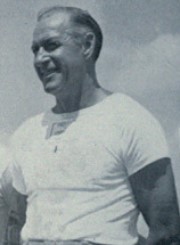
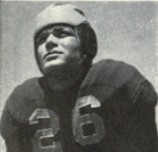
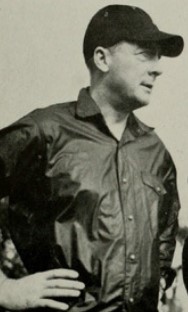
L: Fritz Crisler (University of Michigan Michiganensian Yearbook Class of 1946)
M: Michigan QB Joe Ponsetto (University of Michigan Michiganensian Yearbook Class of 1946)
R: Earl Blaik (United States Military Academy West Point Howitzer Yearbook Class of 1946)
Featured Player
Felix Blanchard Sr. was a star fullback at Tulane shortly before World War I. Determined to have his son follow in his footsteps, the elder Blanchard had young Felix sleeping with a football in his crib when he was an infant and tossing a football back and forth with him when he was a toddler.
The Blanchards moved to South Carolina where Felix Sr. set up his medical practice.
When Felix Jr. reached high school age, his father sent him to the same school that he had attended—St. Stan- islaus in Bay St. Louis MS. A solid 180 lbs., young Doc by his senior year in 1941 was a man among boys on the football field even against the more talented teams from nearby New Orleans.
|
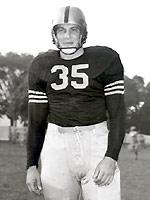 Felix "Doc" Blanchard |
Felix Sr. was not interested in his son attending West Point. So Young Doc chose to play at North Carolina because it was relatively close to his family and Tar Heels coach Jim Tatum was a cousin of Blanchard's mother.
As a 210lb freshman at North Carolina, Blanchard was able to run through the varsity's line during scrimmages while also being fast enough to run around end. The trainer for the freshman team recalled: "Once he knocked out two varsity tacklers on the same play. It got so bad that some of the boys wouldn't even try to tackle him." Glenn Thistlethwaite, a former coach at three colleges, raved about Blanchard. "I've seen all the great fullbacks, including Nagurski, but this boy will be the greatest."
When Blanchard turned 18, he joined the army, underwent basic training, and was assigned to the chemical warfare division at an Army Air Corps base in New Mexico. Meanwhile Blanchard Sr. devoted himself to getting young Felix into West Point. Felix Sr. called Army coach Earl Blaik, who was interested in Little Doc and sug-gested that Blanchard try to get a congressional appointment to West Point for his son. Felix Sr. contacted South Carolina U.S. senator "Cotton Ed" Smith, who provided the necessary appointment.
The last obstacle was getting Blanchard ready for the academic challenges of the Academy. He and a number of other football recruits were sent to Lafayette College in Pennsylvania to study for the "validating" examination at West Point the following summer. When Blanchard finally got to West Point in the fall of 1944, he hadn't played football for two years.
But no problem. Blanchard immediately took over the fullback/linebacker position on the West Point varsity and teamed with another sophomore, Glenn Davis, to form one of the most formidable one-two punches in football history. |
|
Surprising First Quarter
Expected to lose by as many as 35 points, the Wolverines held Army scoreless for the first 20 minutes of play before 70,000 shivering spectators. On the fourth play of the game, Army QB Arnold Tucker heaved a long pass that Davis gathered in on the Michigan 15 behind freshman Walt Teninga and ran into the end zone. But the officials called the play back and penalized Army for holding.
As a sign that they weren't going to roll over and play dead, the Wolverines drove to the Army 17 before losing the ball on downs.
The Cadets, spearheaded by Davis, finally drove 67y in the second quarter to score on a 4y end run by Tom "Shorty" McWilliams, formerly of Mississippi State.
After Michigan was forced to punt after receiving the kickoff, Army doubled their lead when Blanchard ripped through right tackle and easily outran E Leonard Ford to score on a 68y sprint. Army 14 Michigan 0
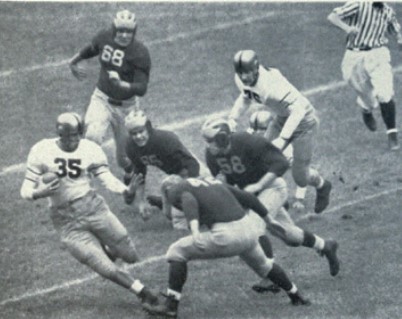
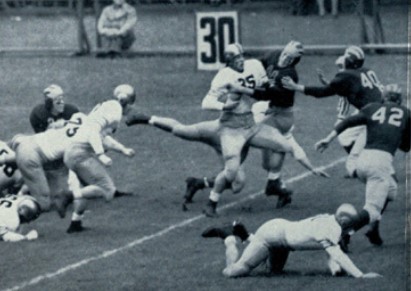
Doc Blanchard eludes Michigan tacklers until Jack Weisenberger halts him.
(University of Michigan Michigansian Yearbook Class of 1946)
Michigan Marches 75y to Touchdown
The Wolverines returned to the field for the start of the second half and marched 75y, mostly on the ground, to score the first touchdown Army had surrendered for the season. Senior Bob Nussbaumer, freshman Walt Teninga, sophomore Henry Fonde, senior Joe Ponsetto, and sophomore Jack Weisenburger all contributed yardage to the drive. The big play was a 33y run by Teninga on the fourth play to the Army 36. A few snaps later, Weisenburger gained 15y on a spinner to put the ball on the eight. From there, Teninga threw a pass that bounced off Army T Dewitt Coulter's shoulder into the hands of Art Penner in the end zone. Army 14 Michigan 7
Army responded immediately. Davis passed 35y to E Dick Pitzer, then raced for 24 more around his right end to the Michigan 12. QB Arnold Tucker passed to E Henry Foldberg for a first down on the four. Just when it looked like Army would regain its 14-point lead, Tucker fumbled while trying to pass and the Wolverines got the ball on their 25.
After forcing a punt, the Cadets were back in Michigan territory on Blanchard's 21y run. But Ponsetto stole the ball out of Foldberg's hands as he took Davis's pass on the 25, and the Wolverines dodged another bullet.
But on the next play, freshman HB Pete Elliott fumbled Ponsetto's lateral, and Blanchard recovered at the Wolverine 30.
This time, Army would not be denied. Davis swung around right end for 14y, and McWilliams circled left end for 15 more to the one. Blanchard bulled his way through the middle for the touchdown with only four seconds left in the third period. Army 21 Michigan 7
Michigan drove to the Army 30 before the drive petered out. On the first play of Army's possession, Davis zipped around right end and outran defensive backs who had the angle on him for 70y to paydirt. Dick Walterhouse converted for the fourth time. Army 28 Michigan 7
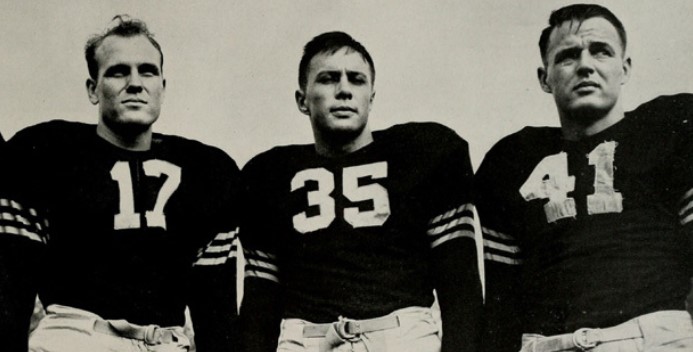
L-R: Arnold Tucker, Doc Blanchard, Glenn Davis
(United States Military Academy West Point Howitzer Yearbook Class of 1946)
Postgame
Army steamrolled all its remaining opponents, including archrival Navy, ranked #2, 32-13. Academy policy prohibited the team from appearing in a bowl game.
Michigan finished its season 7-3 and 5-1 in the Big Ten. One of the losses came to Navy by 33-7. The Wolverines did not play a bowl game because of Big 10 prohibition, which would be lifted the following year in an agreement that sent the league champion to the Rose Bowl each year to face the Pacific Coast Conference champion.